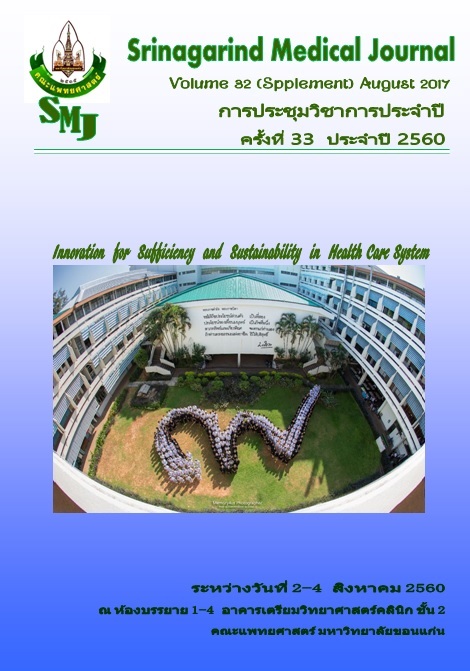Colon Cancer Screening in Direct Relatives of Colon Cancer Patients
Keywords:
Colon cancer screening, Direct relatives of colon cancer patients, Colonoscopy, การคัดกรองมะเร็งลำไส้ใหญ่, ญาติสายตรงมะเร็งลำไส้ใหญ่, การส่องกล้องAbstract
Background and Objective : Colon cancer is the third most common cancer and the fourth most common cause of death from cancer worldwide. Many countries importantly concern on colon cancer screening in direct relatives of colon cancer patients to detect more high risk patients while there are limited medical resources. The objective of this study was to perform colon cancer screening in direct relatives of colon cancer patients.
Material and Method : This was a cross-sectional study and colon cancer screening was performed using colonoscopy with tissue biopsy in 40 cases. The power of test was 0.99. Percentage, average and odd ratio were used to present the statistic data.
Results: The results of colon cancer screening presented that there were12 cases with positive findings, which had colon cancer stage I for 8.3% and precancerous lesion for 91.7%. The majority of precancerous lesion patients had histological findings of tubular adenoma for 75.1%.
Conclusions : Colon cancer screening in direct relatives of colon cancer patients were effectively early detect colon cancer. However, it is difficult to include high risk cases for screening colon cancer. Therefore, key success factors to include high risk cases for colon cancer screening should be further studied.
การคัดกรองมะเร็งลำไส้ใหญ่ในญาติสายตรงผู้ป่วยมะเร็งลำไส้ใหญ่
วิโรจน์ โยมเมือง, เอกมาศ วงศ์ไพรินทร์*, เจริญศรี พิทักษ์ธรรม, ปิยวรรณ เสรีพงศ์, นิทัศนีม วงศ์ไพรินทร์
โรงพยาบาลสตูล อำเภอเมือง จังหวัดสตูล 91000
หลักการและวัตถุประสงค์: โรคมะเร็งลำไส้ใหญ่เป็นโรคที่พบมากเป็นลำดับที่สามจากโรคมะเร็งทั้งหมด และเป็นลำดับที่สี่ของสาเหตุการเสียชีวิตจากโรคมะเร็ง หลายประเทศให้ความสำคัญกับการคัดกรองมะเร็งลำไส้ใหญ่ในญาติสายตรงของผู้ป่วยมะเร็งลำไส้ใหญ่เพื่อให้สามารถค้นหาผู้ป่วยได้มากขึ้นในขณะเรามีทรัพยากรทางการแพทย์ไม่มาก ดังนั้นการศึกษานี้จึงมีวัตถุประสงค์เพื่อคัดกรองมะเร็งลำไส้ใหญ่ในญาติสายตรงผู้ป่วยมะเร็งลำไส้ใหญ่
วิธีการศึกษา: รูปแบบการวิจัยแบบภาคตัดขวาง (cross-sectional study) และคัดกรองโรคมะเร็งลำไส้ใหญ่ด้วยวิธีการส่องกล้อง (colonoscopy) ร่วมกับการตรวจชิ้นเนื้อ (biopsy) จำนวน 40 ราย การคำนวณอำนาจการทดสอบ (power of test)เท่ากับ 0.99 สถิติที่ใช้ ได้แก่ ร้อยละ ค่าเฉลี่ย และ odd ratio
ผลการศึกษา: ผลการคัดกรองมะเร็งลำไส้ใหญ่ พบผู้ที่มีความผิดปกติ จำนวน 12 รายลักษณะความผิดปกติ ได้แก่ colon cancer stage 1 ร้อยละ8.3 และ pre-cancer ร้อยละ 91.7 โดยความผิดปกติในระยะ ก่อนเป็นมะเร็ง (precancerous)พบมากที่สุด คือ tubular adenoma ร้อยละ75.1
สรุป: การคัดกรองมะเร็งลำไส้ใหญ่ในญาติสายตรงสามารถค้นหากลุ่มป่วยได้อย่างมีประสิทธิภาพ แต่การค้นหากลุ่มเสี่ยงเพื่อเข้ารับการคัดกรองทำได้ยาก การศึกษาครั้งต่อไปควรศึกษาปัจจัยความสำเร็จของการเข้าร่วมโครงการ




